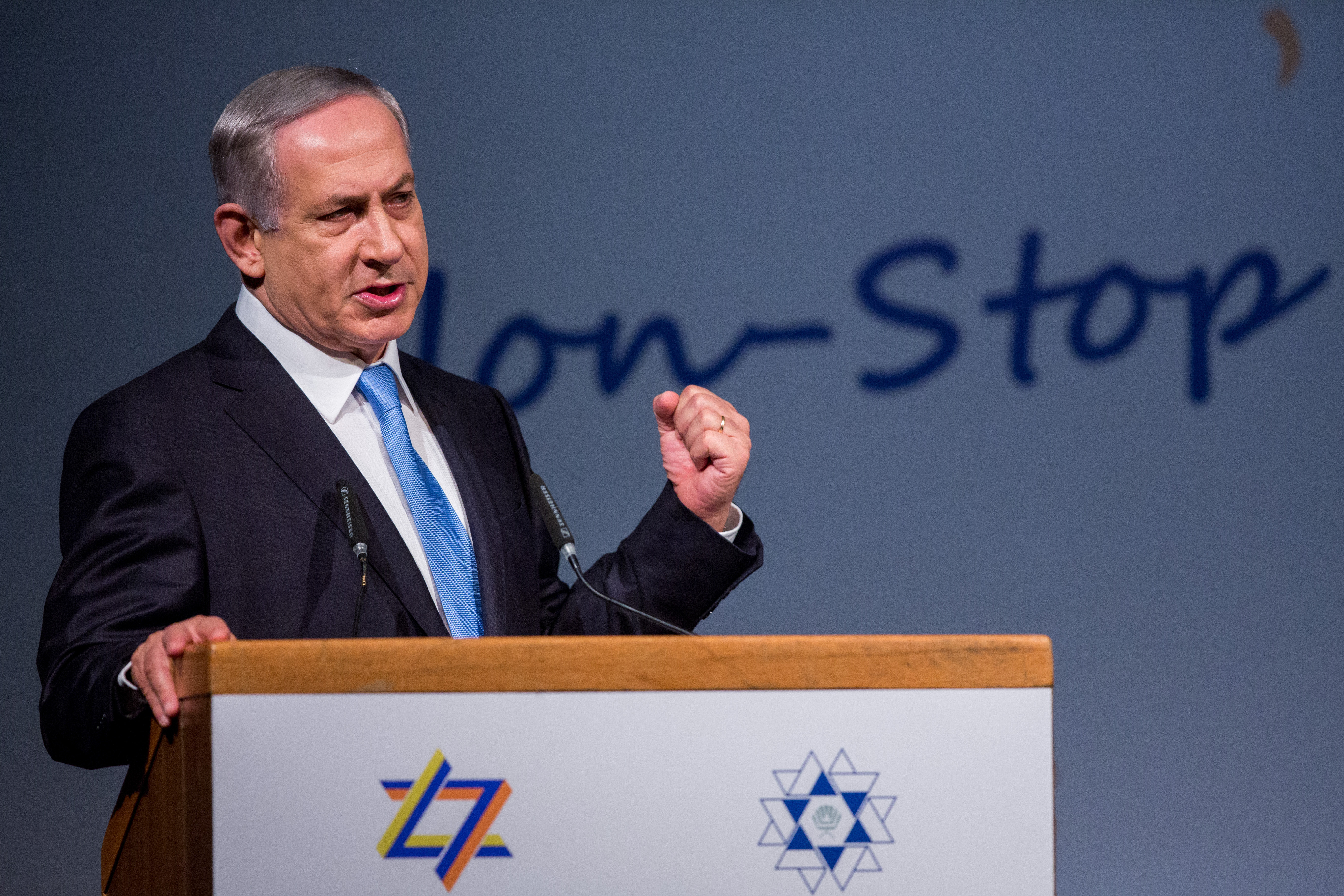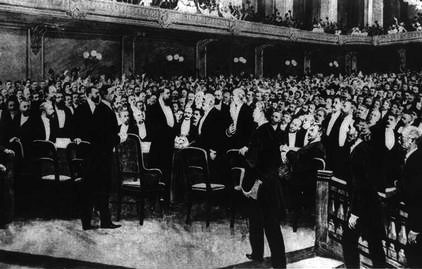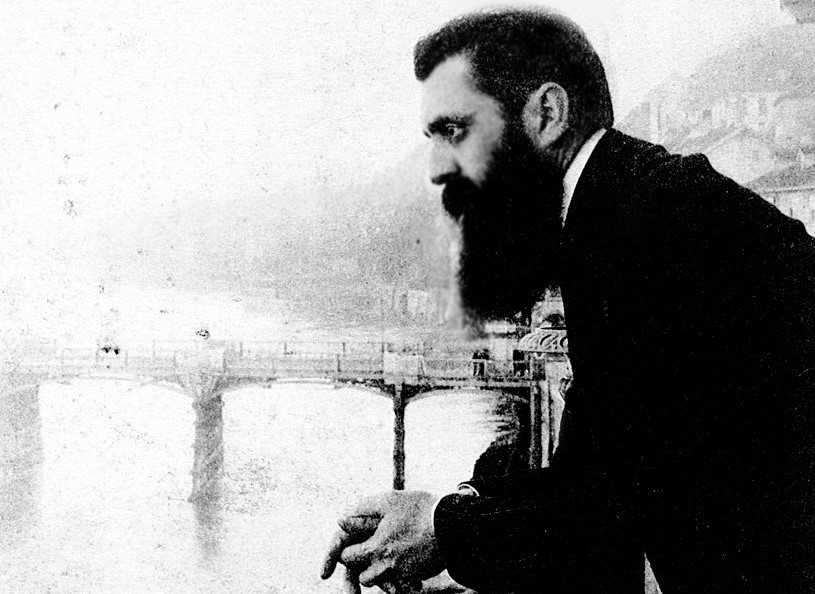Jews in the United States are voting online for slates that represent diverse political beliefs, religious denominations and cultural traditions vying for a seat in the 38th World Zionist Congress (WZC), set to convene in October 2020 in Jerusalem.
Thousands of American Jews are expected to cast their ballots in the elections for the WZC, also known as “the parliament of the Jewish people,” before polls close on March 11. A total of 1,800 candidates across a record number of 15 slates are hoping to secure the available 152 seats the United States holds in the Congress, and as such, have a say in decisions made about the Jewish state and world Jewry over the next five years. Voting began on Tuesday, Jan. 21.
“American delegates make up nearly 30 percent of the Congress. This election presents a rare opportunity for us to participate in strengthening the Jewish community both in the United States, Israel and worldwide,” said the American Zionist Movement (AZM), the U.S. federation in the World Zionist Organization and the election’s organizer.
[It’s] extremely important,” Eugene Lekakh, CEO of the slate American Forum for Israel, told JNS about the election. “This is the only framework where any American Jew can influence the future of Israel and the Jewish people worldwide.”
Eligible voters must be age 18 or older, identify as Jewish, be a permanent resident in the United States (and not voting or planning to vote in the March 2 Israeli general elections), and affirm their commitment to the Jerusalem Program, the official platform of the World Zionist Organization.

Those elected from the United States will join the remaining 500 elected delegates from Israel and around the world at the 38th World Zionist Congress to make decisions regarding four key institutions (the World Zionist Organization, Keren Hayesod, Keren Kayemet LeIsrael–Jewish National Fund and the Jewish Agency for Israel), and its allocation of nearly $1 billion annually to support Israel and Jews around the world.
After the delegates are elected, the Congress forms a Zionist Council proportionate to the total number of delegates in the Congress, and they meet at least once a year. The Zionist Council governs the World Zionist Organization, serves as the general assembly of the Keren Kayemeth LeIsrael-Jewish National Fund, and holds half the seats on both the Jewish Agency for Israel’s board of governors and the board of Keren Hayesod. Together, the four organizations have a budget of $1 billion per year, and the delegates can advise and work in cooperation with the leadership of these groups on direction, strategies and actions.
Theodor Herzl, considered the father of modern-day Zionism, convened the first Zionist Congress in 1897 in Basel, Switzerland. WZC is the only democratically elected global Jewish forum.
‘The diversity of the American Jewish community’
Rav Doron Perez from the No. 4 slate Orthodox Israel Coalition–Mizrahi told JNS, “I often say that this election is one of the most critical elections for the Jewish people that is unknown. It’s a paradox. It’s one of the most important elections that many people haven’t heard about. The key has to be Jews getting involved, getting engaged, coming forward, wanting to play a role,” and feeling strongly about Israel and the future of Judaism.
Backed by Orthodox organizations such as the Rabbinical Council of America and the Orthodox Union, this coalition wants to strengthen Orthodox yeshivahs in Israel and the Diaspora; fight the BDS movement; combat anti-Semitism and anti-Zionism; encourage aliyah; and promote settlements in Judea and Samaria, and in the Golan Heights.

Perez also stressed the need to strengthen the physical security of Jewish communities around the world as one of the major key interests for his slate. He added, “For me, for the first 70 years of the State of Israel, Israel was the project of the Jewish people. Jews were involved in building it. I believe from now and for the next 70 years, the Jewish people need to be the project of the State of Israel. We as Jews and we as national institutions have to share a sense of responsibility for our fellow Jews anywhere in the world.”
He continued, “Every Jewish community around the world is our problem; our privilege. We are partners in dealing with their challenges, and I think perhaps there’s been a little bit of a disconnect between the growth of the communities around the world and the mission of those particular organizations. … I can tell you for the first time in a long time the issues of Diaspora Jewry are now becoming front and center in the conversation of the State of Israel.”
A total of 56,000 people voted in the last election in 2015.
Herbert Block, executive director of the American Zionist Movement, previously told JNS he is expecting an even higher turnout this year, partially because Jews the world over are in a voting mindset with a third election coming up in Israel on March 2 and the 2020 presidential election cycle well underway in the United States.
“We’re excited for so many people representing the diversity of the American Jewish community to affirm their connection to Israel and Zionism by voting in this election,” said Block. “American Jews are increasingly engaged with Israel and want to be involved in the political process. With so much attention focused on Israeli elections, this is an opportunity for American Jews to declare their Zionism and participate in an election that will impact not only Israel, but all world Jewry.”
In the 2015 election, the slate of the Reform movement got 56 spots on the Congress, the Conservative movement got 25, and the main Orthodox delegation received 24. The rest of the seats were split among other parties.
Some slates this year promote that they are geared towards specific minorities and communities. For example, Lekakh told JNS that for American Forum for Israel, which is affiliated with Israeli politician Avigdor Lieberman, one of its many goals is “to let the American Russian-speaking Jewish community have voice and influence within the major Jewish organizations, and have budgets for its community needs: Jewish and Zionist education and pro-Israeli activity.”
“We represent the American Russian-speaking Jewish community, which unfortunately for decades was excluded and distanced from the leading positions in the major Jewish establishment in the United States,” added Lekakh.
It came in fourth place in the last election with 10 seats.
Another slate, Vision, is being led by Rudy Rochman and other millennial activists working to empower younger voices and ensure that the resources of the Zionist movement be strategically directed towards identifying and achieving the next goals of Jewish liberation, according to the party’s platform.
“We are committed to defending Judea and Samaria, decolonizing Jewish identity and promoting fresh conversations about the next goals of Jewish history,” Michael Shepsis, one of the candidates on the Vision slate, told JNS. “We are against the two-state solution because it negates the aspirations of both Jews and Palestinians and has resulted in several new injustices for both people. Rather, we support grassroots engagement to cultivate better relations between both people, based on mutual understanding and respect.”
‘Building the Israeli-American Jewish relationship’
The Israel Shelanu slate, which purports to be the first-ever part of Israelis living in the United States, seeks to represent the views and needs of the fast-growing community.
“As Israelis living in the United States, it is important to us that our children grow up in an open and pluralistic atmosphere, but at the same time, we want them to be exposed to educational and communal activities of Hebrew language and culture,” said Shanie Korabelnik, one of the founders of Israel Shelanu. “Unfortunately, the Jewish community in the United States has not responded to this need, and we have decided to take the lead and take our destiny into our hands.”

Similarly, the Kol Yisrael slate, which is being led by StandWithUs and the Israeli-American Council, is aimed towards renewing interest and innovation in the American Zionist movement, as well as bridging gaps between Israelis and the American Jewish community.
“The mission of building the Israeli-American Jewish relationship is too important for us to stand on the sidelines. A group of us decided that we needed to take action. This new slate will pursue policies that enrich the U.S.-Israel connection,” said Naty Saidoff, chair of the Israel-American Council.
Additionally, No. 8 slate Hatikvah, supported by the American Jewish lobby J Street and journalist Peter Beinart, who has vocally criticized Israel and its policies, said it “oppose[s] the current policy of permanent occupation and annexation” of the West Bank, and that “the occupation is sustained by ongoing policies of repression that only serve to exacerbate conflict and require daily violence to maintain it.” It added that it “proudly stand[s] with those Israelis searching for peace with Palestine.”
Then there is the ZOA Coalition slate, endorsed by many in Netanyahu’s Likud Party, which pushes for a one-state solution; Israeli settlements; a fight against the BDS movement and anti-Semitism; and the creation of what it calls a “Iranian-proxy Palestinian-Arab terror state,” among others.
Linda Sadacka, a campaign manager for the Zionist Organization of American slate, told JNS that “the safety and security of Israel as the homeland of the Jewish people directly affect the safety and security of both Israeli Jews and Jews of the Diaspora. There is a race for victimhood, rather than a race for victory. Too many people believe Israel, which seeks peace and has unilaterally given Gaza to the Arabs without any preconditions, only to be thanked with rocket attacks on civilian population, to be the aggressors.”
Rabbi Josh Weinberg, executive director of the Association of Reform Zionists of America (ARZA), with the slate Vote Reform, told JNS that the modern-day “Zionist mission” needs to be about “the soul of the State of Israel: How do we create a just, exemplary state that the founders of Zionism envisioned?”
He said not voting in the election is a “missed opportunity” to make an impact in the future of Zionism.
“I think the two large Jewish communities in the world—in Israel and North America—rather than looking at the classic model where one is in the center and the others revolve around it, I’d like to think of the model as an ellipse, where the two coincide. And the question is now what can we learn from each other, what can we offer each other in order to benefit from each others existence and enhance each other’s Jewish identity, and to create a stronger Jewish people together.”
He added, “The elections are really an opportunity for Diaspora Jews to weigh in and say we care deeply, and we want to have a say, especially when it comes to some of the budgets of the main establishment organizations of the organized Jewish community, which is a lot of money at stake and a lot of opportunity to make a difference in using those funds. That’s really important, and I think that all American Jews right now should participate in this democratic opportunity.”
Recognizing and understanding the slates
The 15 slates running in the 2020 World Zionist Congress elections are:
Eretz Hakodesh: Led by Pesach Lerner, president of the Coalition for Jewish Values, which represents more than 1,000 Orthodox rabbis in matters of American public policy. The slate’s name, meaning “the Holy Land,” promotes “Jewish values based on the Torah,” and its delegates represent “the yeshivah, Chassidic, Sephardic and Israeli Torah communities” of the United States.
Vote Reform: A combination of the Reform and Reconstructionist movements, the party is committed to religious pluralism and equality within Judaism and in Israel; combating racism, discrimination and hatred; security in the Middle East; a two-state solution for the Israeli-Palestinian conflict; and ensuring that public Jewish funding does not fund projects in settlements in, what Weinberg called, “non-consensus areas.” The list is headed by Rabbi Rick Jacobs, president of the Union for Reform Judaism.
Israel Shelanu: Translated into “Our Israel,” this slate was formed by Israelis living in America seeking to represent Israeli-Americans. It calls for a more “open and pluralistic Jewish culture,” better Hebrew education, and claims that it has “a lot to bring to the current Zionist discussion from an American-Israeli point of view.”
Orthodox Israel Coalition‒Mizrahi: A broad-based coalition of major Religious Zionist and Modern Orthodox organization that has represented Orthodox Jewry in the World Zionist Congress for more than 100 years. The slate, which is headed by Rabbi Hershel Schachter, says it is “dedicated to the timeless values of the Torah, and the centrality of the Land and the State of Israel in Jewish life.”
Vision: This slate is focused on millennials and the “young activists” fighting for Israel on campuses who are promoting “fresh solutions to Israel’s conflict with the Palestinians” since “the two-state model being aggressively promoted for the past 30 years has not and cannot succeed.”
MERCAZ USA: As the Zionist organization of the Conservative/Masorti movement, MERCAZ pushes for no restrictions of the Law of Return, increased funding for its programs, the implementation of the egalitarian prayer plan at the Western Wall and an open Jewish “pluralistic society.”
Dorshei Torah V’Tzion: Supported by the Jewish Orthodox Feminist Alliance, the No. 7 slate seeks improved Israel-Diaspora relations, religious pluralism and the expansion of women’s equality, including in religious setting like yeshivahs. Their candidates include Rabbi Avi Weiss, the first Orthodox rabbi to ordain women; and his first female graduate, Rabba Sara Hurwitz.
Hatikvah: Supported by a number of progressive Jewish organizations such as J Street, the New Israel Fund, National Council of Jewish Women, Ameinu and T’ruah, says its platform is “inspired” by the principles of Israel’s Declaration of Independence. The group has opposed “permanent occupation and annexation,” and “proudly stands with those Israelis searching for peace with Palestine.”
World Sephardic Zionist Organization‒Ohavei Zion: It supports increased funding to promote Sephardic Jewish culture, education and spiritual life, and encourages immigration (aliyah) to Israel.
Herut Zionists: Promoted as “the Jabotinsky movement,” named after the Zionist leader Ze’ev Jabotinsky, Herut calls for “a return to the traditional values of Zionism,” including Jewish settlements on “all parts of the Land of Israel.”
ZOA Coalition: Headed by the Zionist Organization of America, the slate is joined by more than two-dozen “Zionist and Jewish activist groups.” Among its key platform issues are rescuing Jews endangered by global anti-Semitism; combating global and campus anti-Semitism and the BDS movement; rejecting an Iranian-proxy Palestinian-Arab terror state; promoting love and respect for Jewish tradition; defending and strengthening Israel, Israeli sovereignty and the right to settle and live in Judea and Samaria; and strengthening Jewish and Zionist education in Israel and Diaspora.
American Forum for Israel: The slate’s “mission is to raise awareness among American Jews, including those of Russian Jewish origin and other émigré Jewish communities in the United States, of the critical need for Israel to remain a powerful democratic and Jewish state.” The party seeks to “fully integrate” all parts of the Russian-American Jewish Diaspora into mainstream U.S. Jewish community “on the basis of pro-Israel activism and practical Zionism.”
American4Israel: This slate has a list of “10 commandments” that include promoting programs that encourage Zionism activist, and maximizing the rights and improving the financial status of Holocaust survivors.
Kol Yisrael: Backed by giant groups such as StandWithUs, the Israeli-American Council, the Conference of Young Jewish Presidents, it aims to strengthen Israel-Diaspora relationships and empower young American Jews to build a connection with Israel.
Shas Olami: Affiliated with Israel’s Sephardic Orthodox party Shas, it focuses on “strengthening Sephardic traditions and values worldwide.”


























